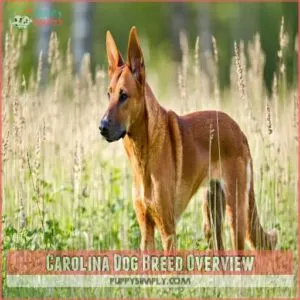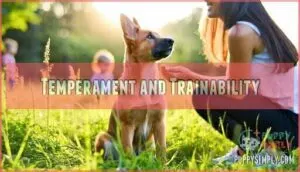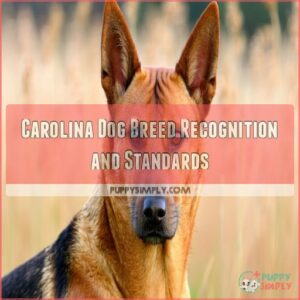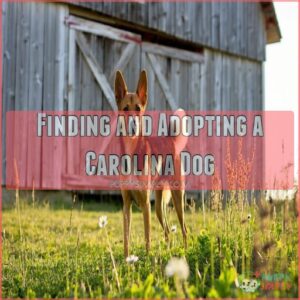This site is supported by our readers. We may earn a commission, at no cost to you, if you purchase through links.

With their tall ears and graceful, agile bodies, they’re like furry time travelers from the past!
Carolina Dogs have a unique combination of independence and loyalty, making them quite the engaging companions.
They’re generally good-natured and get along well with families, although their free-spirited nature can lead to unexpected adventures.
Because they’re not the most common dogs, owning one can feel like being part of a secret club.
Curious about what makes these dogs truly unique? Keep reading!
Table Of Contents
- Key Takeaways
- Carolina Dog Breed Overview
- What is a Carolina Dog?
- Carolina Dog Characteristics
- Temperament and Trainability
- Grooming and Health Needs
- Exercise and Lifestyle Requirements
- Carolina Dog Breed Recognition and Standards
- Finding and Adopting a Carolina Dog
- Little-Known Facts About Carolina Dogs
- Owning a Carolina Dog: Pros and Cons
- Frequently Asked Questions (FAQs)
- Is a Carolina Dog a good pet?
- Are Carolina dogs part of the dingo?
- How do I know if my dog is a Carolina Dog?
- What is the behavior of a Carolina Dog?
- How do Carolina Dogs interact with children?
- What unique behaviors do Carolina Dogs exhibit?
- Are Carolina Dogs suitable for apartment living?
- How to socialize a Carolina Dog effectively?
- Can Carolina Dogs adapt to extreme climates?
- Conclusion
Key Takeaways
- You’ll find Carolina Dogs are uniquely American, stemming from ancient Asian dogs that arrived with Native Americans. They’re known for their wild heritage and are officially recognized by the UKC.
- Their appearance includes a lean, athletic build, short coat in earthy tones, and distinctive pointed ears and a curved tail. They’re medium-sized, typically weighing 30-55 pounds.
- You’ll discover they’re intelligent and loyal but independent, needing consistent training and socialization. Their prey drive means careful management around smaller animals is necessary.
- You should know they’re relatively low-maintenance but shed heavily twice a year. They need significant daily exercise and mental stimulation to thrive.
Carolina Dog Breed Overview
You’ll discover that Carolina Dogs are unique American-bred canines with a fascinating history as wild dogs that once roamed freely in the southeastern United States.
Whether you’re looking for a loyal family companion or an adventurous hiking buddy, these adaptable dogs can fit into your lifestyle with their gentle nature and natural intelligence.
Origins and History
Ever stumbled upon a dog that looks like it stepped right out of ancient times?
That’s the Carolina Dog, also known as the American Dingo.
These remarkable canines trace their roots back to the pariah dogs that accompanied Native Americans across the Bering Land Bridge.
Living freely in the Southeastern US for centuries, they’ve maintained their primitive traits.
The UKC officially recognized them in 1996, while they’re currently in AKC’s Foundation Stock Service.
Physical Characteristics
A Carolina dog’s wild heritage shines through in their distinctive physical features.
You’ll notice their athletic build combines strength with agility, perfect for their historical role as hunters.
Here’s what makes them stand out:
- Medium-sized head with almond-shaped eyes and pointed ears that swivel like radar dishes
- Muscular body with a deep chest and fish-hook shaped tail
- Short, dense coat in earthy colors like tan, yellow, or black
Temperament and Intelligence
While their athletic build catches your eye, it’s the Carolina Dog’s sharp mind that’ll truly win you over.
You’ll find these clever canines are natural problem-solvers with strong pack instincts.
They’re fiercely loyal to their families but can show a reserved side with strangers.
Think of them as the quiet observers at a party – they’ll warm up once they trust you, showing their playful and adaptable nature.
What is a Carolina Dog?
Back in the 1970s, scientists discovered a remarkable breed living wild in the American Southeast – the Carolina Dog, also known as the American Dingo or Dixie Dingo. These primitive canines share DNA with ancient Asian dogs, suggesting they crossed the Bering Land Bridge with early Native Americans. Today, you’ll find them both in the wild and as beloved family pets. Although they aren’t typically considered one of the top guard dog breeds with protective and aggressive behavior (guard dog characteristics), they do possess a strong instinct to protect their pack.
Here’s what makes Carolina Dogs truly special:
- They’re one of North America’s only naturally selected wild dogs
- Their pack-oriented behavior mirrors that of their ancient ancestors
- They possess unique survival instincts rarely seen in domestic breeds
You might wonder if these former wild dogs can adapt to family life. The answer’s yes – they’ve proven themselves to be loyal, intelligent companions while maintaining their fascinating primitive traits. They’re living pieces of American history, bridging the gap between wild canines and domestic pets.
Carolina Dog Characteristics
You’ll notice a Carolina Dog’s distinctive appearance right away, with their short tan or yellow coat, pointed ears, and curved tail that sets them apart from other breeds.
Their medium-sized frame, typically weighing between 30 to 55 pounds, makes them just right for both active outdoor adventures and cozy family cuddles.
Coat and Color Variations
The Carolina Dog’s coat is a marvel of natural selection, featuring a short, dense double layer that comes in various striking colors. You’ll find these ancient canines sporting rich reds, warm tans, and deep blacks – sometimes with white markings on their chest.
While their coat colors appear vibrant to us, their limited color perception, similar to red-green color blindness, means they perceive the world in a more muted color palette.
Regular shedding keeps their coat healthy, with seasonal "blowing" of their undercoat twice a year.
Despite their wild heritage, they’re surprisingly clean and self-grooming.
Size and Weight
Standing at an ideal height of 18-20 inches at the shoulder, Carolina Dogs pack a lot of personality into their medium-sized frame.
You’ll find these primitive pups typically weigh between 30-55 pounds, with females running slightly smaller than males.
- Small females typically weigh 30-40 pounds
- Large males can reach up to 55 pounds
- Puppies gain about 2-3 pounds per month
- Adults maintain healthy weight through portion control
Body Type and Structure
Beyond their weight range, Carolina dogs showcase a striking wild-dog physique.
You’ll notice their deep chest, athletic build, and well-muscled shoulders that hint at their survival-focused heritage, which makes them perfect for wearing a sturdy Carolina dog collar.
These medium-sized dogs feature a distinctive fish-hook tail, gently sloping back, and wedge-shaped head with upright ears.
Their long legs and balanced proportions give them the grace of their ancient ancestors.
Temperament and Trainability
You’ll find that Carolina Dogs combine their wild heritage with a surprisingly trainable nature, making them both loyal companions and quick learners when you use positive reinforcement.
While they’re naturally reserved with strangers, you can count on their intelligence and willingness to please, which helps them excel in obedience training and family activities.
Are Carolina Dogs Good With Children?
When properly socialized, Carolina Dogs make wonderful companions for children, thanks to their gentle nature and protective instincts.
Your Carolina pup will naturally take on these key roles with kids:
- Patient playmate who matches their energy level
- Watchful guardian who stays close during outdoor adventures
- Loyal friend who forms deep emotional bonds
To make sure safe and enjoyable walks with your child and Carolina Dog, consider investing in a Carolina dog leash.
Remember to supervise all interactions and teach children proper handling techniques for the best relationship.
Interaction With Other Pets
Thanks to their pack mentality, Carolina Dogs typically get along well with other dogs when properly socialized.
Their strong prey drive means they might chase smaller pets like cats or rabbits, but early exposure can help.
In multi-pet households, they’ll often establish a clear hierarchy, respecting their "pack order."
Your Carolina Dog may even become protective of their furry siblings.
Training Methods and Tips
Positive reinforcement works wonders with Carolina Dogs’ natural intelligence.
Start training early and keep sessions short but consistent – they’ll pick up commands quickly when treats and praise are involved.
You’ll find these clever pups respond well to clicker training and food rewards.
Remember to stay patient; their independent streak means they might test boundaries, but they’re keen to please once they trust you.
Grooming and Health Needs
You’ll be glad to know that Carolina Dogs are known for their low-maintenance grooming needs, as they’re natural self-groomers who keep themselves remarkably clean.
While they’ll need your attention during their twice-yearly heavy shedding seasons, their overall health care is straightforward, with few breed-specific concerns to watch for.
Shedding and Coat Maintenance
Carolina Dogs self-groom like cats, but they’ll still need your help managing their heavy shedding. You’ll find their short, dense coat drops fur year-round, with extra fluff flying during seasonal changes.
Here’s what you’ll need to keep shedding under control:
- A rubber curry brush for daily quick-brushes
- A deshedding tool for weekly deep grooming
- A vacuum that’s ready for action
Keep brushing sessions short and sweet – these pups aren’t fans of long grooming rituals.
Common Health Concerns
While these primitive pups are generally hardy, they do have a few health quirks to watch for.
Your Carolina Dog might be sensitive to ivermectin, a common heartworm medication, so always check with your vet first.
Keep an eye out for hip and elbow dysplasia, especially in older dogs.
Ancient breeds like the Chihuahua, originally bred for ancient Mexico roles, have evolved over time and can benefit from regular care. Regular dental cleanings and ear checks help prevent common issues, making these ancient companions thrive in modern homes.
Nutrition and Diet Requirements
Your Carolina Dog’s diet needs special attention to match their wild roots.
They thrive on high-quality kibble or homemade food rich in protein, but watch out for food sensitivities – they can be picky eaters.
Keep portions in check to prevent obesity, especially for puppies who need balanced nutrition for healthy growth.
When in doubt about your pup’s diet, your vet’s got your back.
Exercise and Lifestyle Requirements
You’ll need to channel your Carolina Dog’s natural energy with plenty of running, hiking, or backyard play time to keep them happy and well-behaved.
Your primitive pup won’t be content as a couch potato, so plan on giving them at least an hour of exercise each day, plus mental challenges to satisfy their wild instincts.
Daily Exercise Needs
Let’s talk daily movement requirements for these energetic pups! A pack mentality means they’ll match your lifestyle, but don’t let that fool you – these athletic dogs need serious exercise to stay happy and balanced.
- Two 45-minute walks daily to burn energy
- Interactive fetch games for mental stimulation
- Swimming sessions (they’re natural water lovers!)
- Agility training to challenge body and mind
- Pack walks with other dogs for social bonding
Think of exercise as their daily adventure – it’s not just about physical activity, but keeping their primitive instincts satisfied and their minds sharp.
Space and Living Arrangements
Beyond daily walks, Carolina Dogs need living spaces that match their wild heritage. Here’s a breakdown of their space requirements:
| Living Space | Suitability Rating |
|---|---|
| Large House + Yard | Excellent |
| Small House + Yard | Good |
| Apartment + Park Access | Fair |
| Studio Apartment | Poor |
Their pack mentality means they’re happiest in multi-dog households, but they’ll adapt to single-dog homes with proper attention.
A secure 6-foot fence is non-negotiable – these clever escape artists can easily clear lower barriers.
Mental Stimulation and Activities
Carolina Dogs need mental workouts as much as physical exercise to stay sharp and happy.
Think of them as brainy adventurers who love solving puzzles and following their nose – just like their wild ancestors did.
- Set up scent trails with treats hidden around your yard for natural tracking practice
- Try puzzle toys that dispense kibble when solved – they’re absolute champions at figuring these out
- Mix in agility training sessions to challenge both mind and body
Carolina Dog Breed Recognition and Standards
You’ll be pleased to know that the Carolina Dog breed earned official recognition from the United Kennel Club in 1996 and is now part of the American Kennel Club’s Foundation Stock Service.
Whether you’re interested in showing your Carolina Dog or just want to understand the breed standards better, you’ll find these wild-turned-domestic dogs have specific height, weight, and appearance requirements that set them apart from other breeds.
UKC and AKC Recognition
If you’ve got a Carolina Dog, you’re part of an exclusive club.
The United Kennel Club (UKC) officially recognized these primitive pooches in 1996, marking a milestone for the breed.
While they’re not yet fully AKC-recognized, they’ve earned a spot in the AKC Foundation Stock Service – think of it as the waiting room for up-and-coming breeds.
This recognition has helped boost their visibility and preservation efforts.
Breed Standards and Characteristics
While breed recognition opens doors, understanding the official standards helps you know what to expect from your Carolina Dog, as they require a similar level of exercise and mental stimulation as Jack Russell Terriers, who need daily exercise routines.
You’ll notice their distinctive features: almond-shaped eyes, pointed ears, and a fish-hook tail.
Their body should be well-muscled but lean, with a deep chest and tucked-up belly.
The breed standard calls for a short, dense coat that comes in shades of tan, yellow, black, or red.
Differences From Other Breeds
You’ve likely heard the Carolina Dog called an American Dingo, Dixie Dingo, or Yaller.
Unlike other breeds, their hunting instincts and pack dynamics set them apart.
They vocalize in unique ways, much like their primitive ancestors.
Plus, they adapt to various living situations, though their shedding patterns can test your patience.
Their wild roots make them unlike any typical pet.
Finding and Adopting a Carolina Dog
Finding and adopting a Carolina Dog might feel like searching for a hidden gem, but it’s easier than you think with the right guidance.
Reputable breeders and local rescues can help you find your perfect canine companion.
Understanding the adoption process and costs makes sure you’re well-prepared for your new canine companion.
Reputable Breeders and Rescues
Baffled by Carolina Dog breed standards?
Let’s explore finding ethical breeders and savvy rescues.
Ethical breeder checklists can be your roadmap, ensuring healthy pups that fit breed criteria.
Rescues specialize in finding homes for Carolina Dogs, so explore their networks.
Remember, seeking reputable breeders or rescues ensures a happy, healthy addition to your family.
Adoption Process and Costs
Finding your Carolina Dog buddy involves some planning. Start by exploring local rescue networks and ethical breeders. Adoption fees vary but expect around $200 from rescues, while breeders might charge $800 to $2,000, though some can be as high as the Bichon Frise purchase price.
Here’s your game plan:
- Join breed clubs for updates and waiting lists.
- Connect with rescues for rehoming options.
- Evaluate breeder ethics thoroughly.
Preparing for a New Pet
Getting ready for your new Carolina Dog feels like preparing for a family reunion.
Gather pet supplies, enlist in training classes, and schedule vet visits.
Make sure your home is safe, making lifestyle adjustments for exercise and play.
Adoption through rescue agencies or breeders involves knowing potential health problems, like those common in breeds such as the Belgian Malinois, who are prone to elbow and hip dysplasia, focusing on socialization, and integrating smoothly into your pack.
It’s a journey worth embracing!
Little-Known Facts About Carolina Dogs
You might think you know everything about dogs, but the Carolina Dog will surprise you with its wild origins and unique quirks.
These fascinating canines have adapted to both life as a free-roaming animal and a loyal companion, showing how diverse a dog’s history can truly be.
Wild Origins and Ancestry
So, you’re ready to adopt? Great! Now, let’s talk about the Carolina Dog‘s wild side.
These dogs aren’t just any mutt; they boast a fascinating past.
Think "Pariah dog origins"—their ancestors were likely with early Native American settlers.
For centuries, they lived feral, roaming the Southeastern US.
To uncover the secrets of your new pet’s ancestry, consider a Carolina Dog DNA test.
Genetic testing confirms their unique place in the wild dogs in the US family.
Some even call them American Dingos, a testament to their primitive breed status.
Unique Behaviors and Traits
Carolina Dogs have intriguing traits, thanks to their wild ancestry.
Their independent nature shines, often showing a high prey drive.
You’ll notice their unique vocalizations during play, reflecting their pack-oriented instincts.
These adaptable canines thrive in social hierarchies, reminiscent of their primitive roots.
It’s like having a part-time adventurer who naps during the day, but is alert by night—standing guard.
Conservation Status and Efforts
Isn’t it fascinating that these dogs, once feral and roaming wild, hold a special conservation status?
However, their population trends show challenges like genetic diversity and habitat loss.
Additionally, similar to mixed-breed dogs with genetic diversity, Carolina Dogs can thrive due to their varied ancestry.
Conservation groups and breeding programs work tirelessly to protect this rare dog breed. With some breeds naturally exhibiting protective aggression towards strangers understanding dog aggression, it’s crucial that programs prioritize careful breeding and socialization.
Rescue groups often play matchmaker, helping these unique Carolina Dogs find loving homes, ensuring they thrive as cherished companions.
Owning a Carolina Dog: Pros and Cons
Thinking about adding a Carolina Dog to your family?
Weighing up the pros and cons can help you decide if this adventurous, loyal pup fits your lifestyle or if that shedding and strong prey drive might’ve you chasing your tail.
Benefits of Ownership
Imagine this: a loyal companion always by your side, the Carolina Dog shines in family settings with its adaptable nature.
Acting as a gentle watchdog, it’s adventurous yet reserved—a perfect mix for kids and adults alike.
Add to that their low-maintenance lifestyle, and you’ve got a delightful, family-friendly pet ready to join your pack.
Challenges and Drawbacks
While Carolina Dogs offer loyalty and cleanliness, they’ve got quirks that might ruffle some feathers.
Their strong prey drive and independent nature require vigilant training and management.
Heavy shedding means extra cleaning, and their pack mentality demands a close-knit family.
With potential for mouthiness and wanderlust, these dogs aren’t for the faint-hearted. Ready for a challenge?
Is a Carolina Dog Right for You?
Are you ready for the Carolina Dog adventure?
With their loyal, gentle, and reserved demeanor, these dogs make fantastic companions, but they’re not for everyone.
Their playful nature and need for exercise require an active lifestyle and commitment.
Perfect for families but challenging if left alone often.
Consider your routine, space, and commitment before choosing this unique canine friend.
Frequently Asked Questions (FAQs)
Is a Carolina Dog a good pet?
Ever wondered if a dog’s loyalty matches their wild side?
Carolina Dogs are loyal and adaptable, thriving in family settings.
Their strong pack mentality and gentle nature make them great companions, but they need lots of exercise.
Are Carolina dogs part of the dingo?
Carolina Dogs aren’t directly part of the dingo family, but they share similarities as primitive breeds.
Carolina Dogs are believed to have descended from Asia, adapting over time to their new environments.
Just like dingoes, they are believed to have descended from Asia, adapting over time to their new environments.
How do I know if my dog is a Carolina Dog?
A watched pot never boils, and identifying a Carolina Dog involves checking its distinctive traits: a lean build, erect ears, a curved fishhook tail, and short, dense coat.
Observing behavior like reserved loyalty also provides clues.
What is the behavior of a Carolina Dog?
You’ll find them loyal and adaptable, but also independent and adventurous. They’re gentle with their people but possess a strong prey drive. Expect a smart dog needing consistent training.
How do Carolina Dogs interact with children?
Imagine this: a furry sibling who’s part of the pack, not a pet.
Carolina Dogs blend well with children, showing loyalty and gentleness.
They’re playful yet reserved, teaching kids responsibility while thriving in active family settings.
What unique behaviors do Carolina Dogs exhibit?
These dogs exhibit unique pack behaviors, often using complex vocalizations and body language to communicate.
They’re adept diggers, sometimes creating elaborate burrows and love exploring familiar routes.
Often forming strong bonds with their human "pack" members.
Are Carolina Dogs suitable for apartment living?
Carolina Dogs might feel like wild explorers confined in apartments.
They need space to roam and adventure, making them better suited to homes with yards.
Regular outdoor activities are essential to keep their spirits high and tails wagging.
How to socialize a Carolina Dog effectively?
Start socializing your Carolina Dog early with consistent exposure to diverse environments, people, and other dogs.
Use positive reinforcement like treats and praise to build confidence.
Regular playdates and visits to dog-friendly parks will enhance their social skills.
Can Carolina Dogs adapt to extreme climates?
Think of a chameleon switching its colors: while Carolina Dogs can handle different climates, extreme temperatures challenge them.
Extreme temperatures challenge them.
Make sure they’ve plenty of shade, water, and warmth when needed to keep them comfortable and healthy.
Conclusion
Imagine owning a little piece of history with the Carolina Dog by your side.
These charming canines blend the charm of wild ancestors with the warmth of a family pet, making them a unique choice for dog lovers.
With their independent spirit and loving nature, they’re ready for any adventure you go on.
Whether you’re drawn by their heritage or their heart, the Carolina Dog might just be the perfect fit for your family’s next furry member.

















